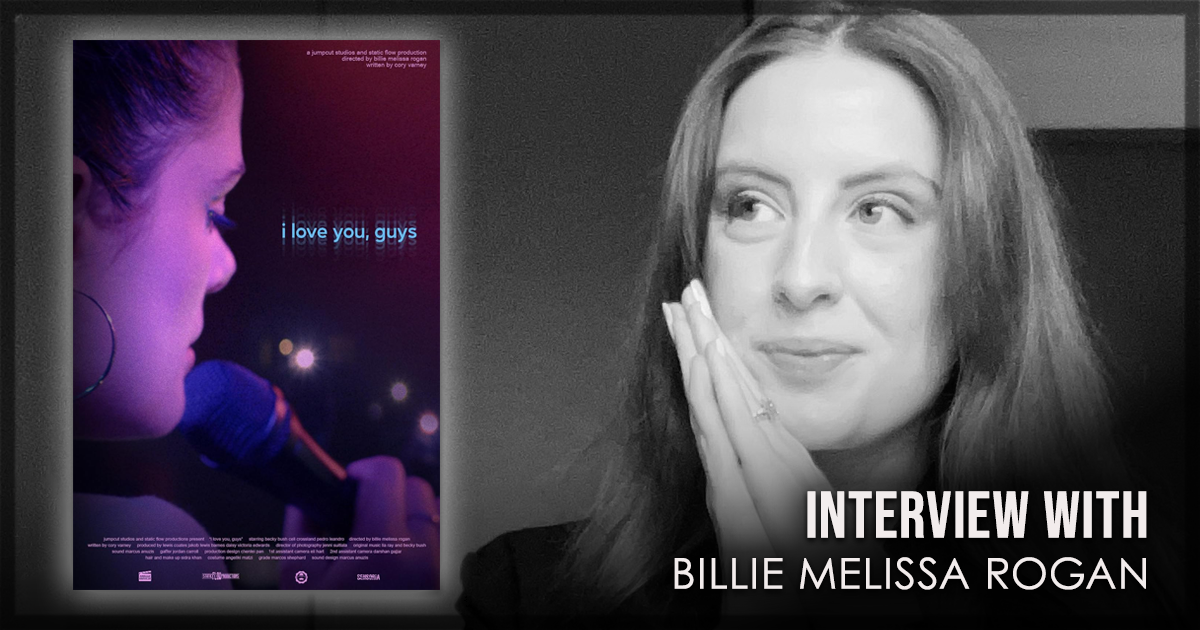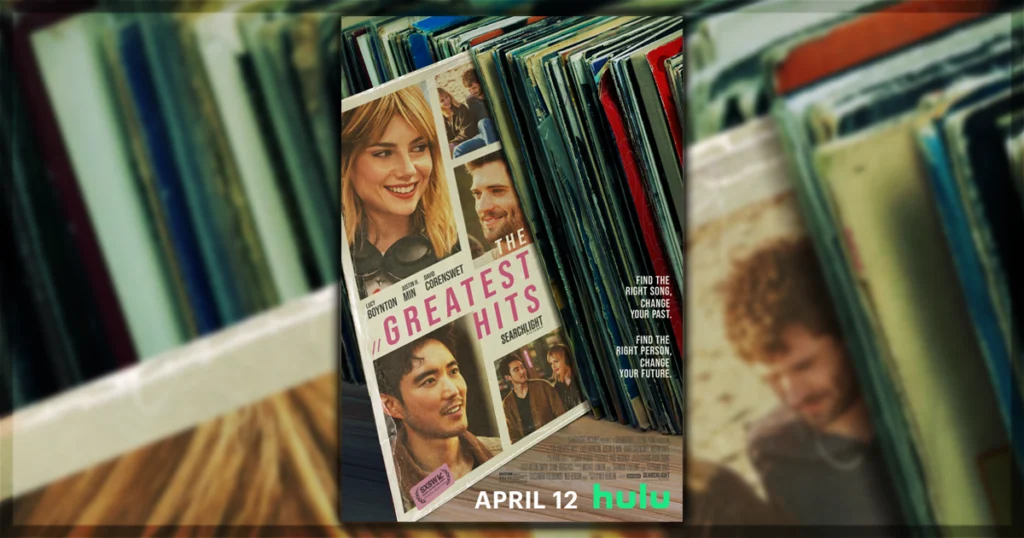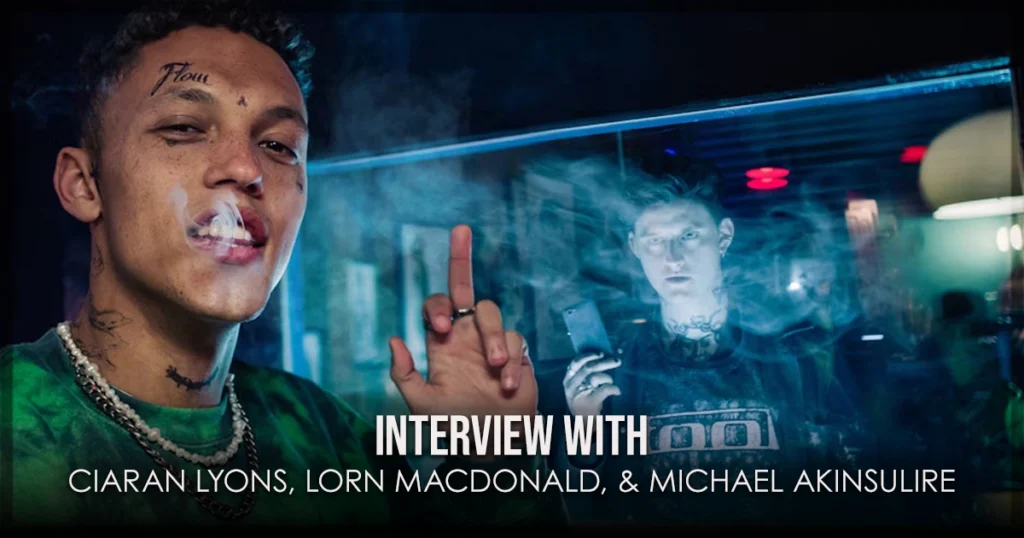It’s very difficult to portray someone’s mental health in a movie due to a variety of reasons. However, when it comes to talking about the mental health issues of celebrities, things get even tougher. There have been a lot of movies depicting musicians struggling things, but none of them have tackled these struggles like I Love You, Guys, a new short film by Billie Melissa Rogan. The short film chronicles the journey of a young singing sensation named Sky (played by Becky Bush). She has garnered a lot of fame through her music, but she’s still finding ways to cope with her anxiety. The film captures every minor detail of Sky’s emotions and takes viewers on a journey that might take them to a time when they also felt something similar.
Debutant director Billie Melissa Rogan masterfully brings Cory Varney’s screenplay to life with her impeccable skills. Rogan, an entertainment journalist, has been searching for the perfect script for quite some time now. Finally, she stumbled upon I Love You, Guys, and instantly felt a deep connection to it. But it hasn’t been an easy journey for the film and the people attached to it. They overcame many obstacles to bring this movie to a broader audience. However, Rogan feels that these obstacles helped them to make the project even better and made them realize how they wanted to tackle the story.
In addition to chasing her dream of becoming a filmmaker, Rogan also balances her love for cinema with analyzing movies. I got a chance to sit down with Rogan over Zoom to discuss her debut project and what made her pursue filmmaking.
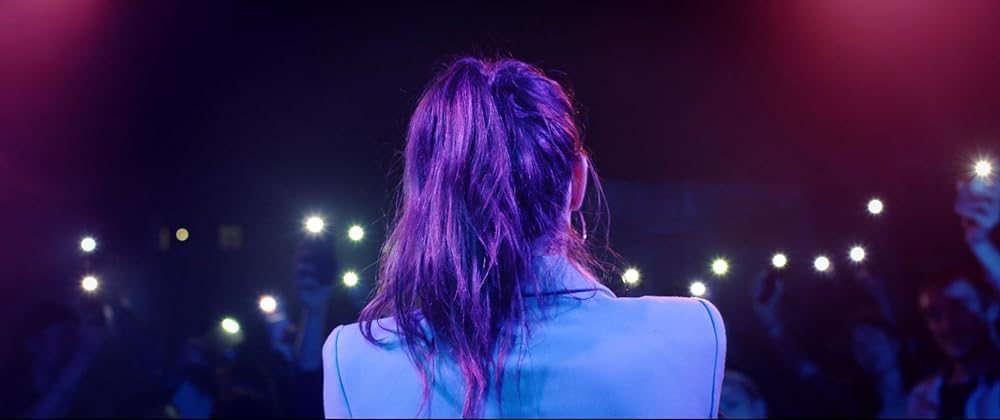
The Interview with I Love You, Guys director Billie Melissa Rogan
[Editor’s note: This interview has been lightly edited for clarity.]
Aayush Sharma: First of all, a massive congratulations, Billie, on your film, I Love You, Guys, a beautiful, beautiful short film and it talks about a very important issue, mental health in the music industry. But before we talk about this film, I would love to know about your filmmaking journey. What initially inspired you to pursue a career behind the camera?
Billie Melissa Rogan: Thank you for saying that. I appreciate it. I’m so grateful that anyone took any time to watch it at all. My journey into film is really long and complicated, I try and simplify it as much as possible. But I grew up desperately wanting to act on stage. I had no interest in film really, and I was training and going to singing, dance and drama classes.
Billie Melissa Rogan: And then I got to drama school, which is the actor’s equivalent of university, and it was just the worst thing ever. It was so horrible. I started having anxiety and depression for the first time in my life, and it was just so terrifying to have reached your life’s goal and hate every second of it. I moved back in with my parents and I was still dealing with all of these issues. And then I would go to the cinema because it was the only place where no one can really get to you.
Billie Melissa Rogan: It’s completely dark. You just have to sit with a story. You can’t check your phone, you can’t do anything. And it just became this place of safety for me. And I remember specifically I saw David O. Russell’s film, Joy. It came out in New Year’s Day 2016 in the UK, and I took all my family to go see it, and I just fell in love with it. I really felt myself represented, which sounds crazy.
Billie Melissa Rogan: I was 19 years old and so young, but I felt like my life had ended and I had given up on all my dreams similarly to Joy in the film. And that is when I took an interest in becoming a director because I’d seen David O. Russell’s other work and I’d studied film before, I was familiar with his stuff, and I was familiar with Jennifer Lawrence’s work, and that’s why I went to see it.
Billie Melissa Rogan: But it just really spoke to me and I was like, “This is what I want to do. I want to make people feel seen. And I want to make them feel heard and represented,” because it’s so powerful, it’s such a powerful medium, and it’s really accessible, and you’d be hard-pressed to find someone who’s never seen a film before. I just thought it was the best medium to be able to do that.
On how Billie Melissa Rogan came across the I Love You, Guys script from Cory Varney
Aayush Sharma: Amazing, very inspiring journey that you have. But if we talk about, I Love You, Guys, how did you come across the script of this short film and what attracted you to it for your directorial debut?
Billie Melissa Rogan: There was a publication called Jump Cut Online in the UK, and they had branched out and created a production company, and they were looking to connect with other filmmakers in the UK, and they just put a tweet out, put their email being like, “Hey, email us if you’re a filmmaker.” And I sent them an email and said that I was the director.
Billie Melissa Rogan: I was in film school at the time, and we were talking about a different project. Initially, I’d written the script that I wanted to direct, but it was a feature, and they were mainly interested in shorts at the time, and they were like, “Here’s this script that we just had sent to us. Read it and let us know what you think.” And immediately when I read it, I saw it. I saw it so clearly on the page, Cory’s words just evoke imagery. They’re so easy to see. And I understood it, and I sent them back a mood board. I was like, “Here’s what I see. Let me know what you think.” And originally the script was more like, have you seen Searching?
Aayush Sharma: Yes.
Billie Melissa Rogan: It was like that. It was meant to be entirely online and pursuing more that route of storytelling. But Cory started developing it, and then it grew into something a lot bigger, and that is how it became the film that it is now. And it’s so weird because I started making it when I was 23 years old, 22 years old, and now I’m 27, and it’s only just come out. Meaning has changed so much to me over time. What I saw in it initially is not what I see in it now. It’s been really interesting to see.

On the challenges and the journey to getting this short film made
Aayush Sharma: Actually, my next question is about the journey, the journey to the release of I Love You Guys, a lot of obstacles. What were some of the challenges you faced and how did you maintain your motivation during such difficult times?
Billie Melissa Rogan: It was a wild, wild, wild ride. It’s taken years, and that is something that feature films take years, like short films, they’re not supposed to take years, but I got the script April 2019. We cast the film in November of 2019, and then we started crowdfunding in March of 2020, and then lockdown happened and the pandemic hit. And we never got onto set until May of 2021.
Billie Melissa Rogan: And I think because of the pandemic, none of us, it was not our priority. Everyone was going through so many different emotions and dealing with so much that it just wasn’t at the forefront of our mind because the world was quite literally falling apart. And it didn’t really seem like an obstacle as more of a blessing to keep us and everybody else safe and off the set, obviously.
Billie Melissa Rogan: And by the time we got onto set in May 2021, restrictions hadn’t lifted yet, but things were starting to wind down. But then immediately after we finished the UK went back into lockdown again. And we couldn’t continue filming. II was moving to New York, I moved to New York in September of 2021, and we didn’t film again until November of 2021. And I was directing over Zoom. That was a new experience for me because I’d never done that before. And I think everyone was learning to make films differently.
On the influence of other films in I Love You, Guys
Billie Melissa Rogan: And then after that, I don’t know what happened. I think we ran out of money actually. And we couldn’t finish the film. And then the Sheffield, I don’t know if it’s the arts fund, our producer, Lewis Coates, dealt with that, but he got us funding to do the final part of the film, which we shot in July of 2022.
Billie Melissa Rogan: And I am so grateful that it ended up being the way it did because throughout that time, different influences were coming out. I remember the Billie Eilish documentary had come out and Baz Luhrmann’s Elvis had come out just before we shot the concert scenes. And that was like gold dust because so many of the shots in that film I stole from Baz Luhrmann, was showing my DOP, I was like, “This, this is what I want, please, we need to get it like this.”
Billie Melissa Rogan: I think the close-up shot of Austin Butler’s eyes, I was like, “That’s our opening shot. That has to be the opening thing.” I’m really grateful for all of the obstacles really, because I don’t know if it would’ve been exactly the same as it is now. And I think in terms of motivation, really what it was was that so many people, I think it was over 200 people donated to our Kickstarter, and we wanted to make sure that we completed it for those people who believed in us, because filmmaking is so difficult, and it’s so rare to make a movie and to make a movie without any grants or without any studio support.
Billie Melissa Rogan: I really felt like we needed to show people that you don’t need all of these, community is enough. You don’t need all of these funds and things. We can do it on our own and we can make something good without having to have all of these permissions to tell us that we’re allowed to make films. That was really my motivation for getting it finished despite all of the obstacles that came our way.
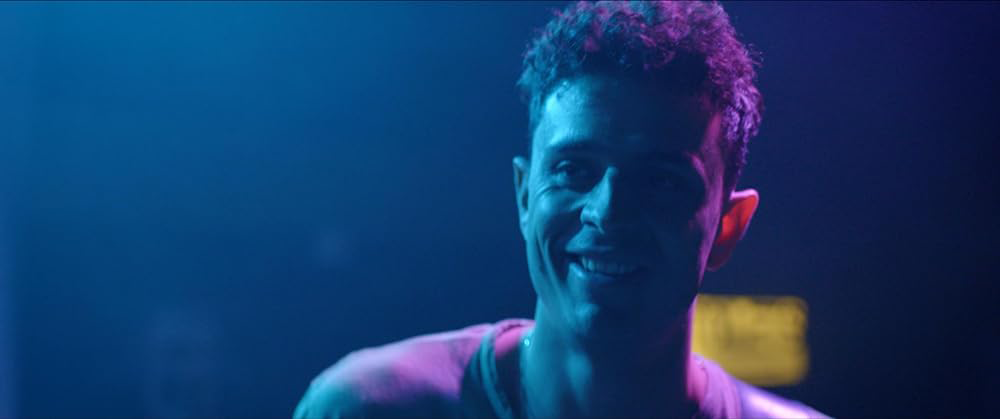
On more visual and audio inspirations of the film
Aayush Sharma: Great work. You talked about Elvis and the camera angles, how you wanted certain shots to be. The production aesthetic of this short film is quite remarkable. Can you elaborate on the discussions you had with the studio regarding the visual and auditory elements of the film?
Billie Melissa Rogan: They pretty much stayed the same the whole way through. Our main reference points were I, Tonya and Her and Silver Linings Playbook. And those three films over and over again were what we kept coming back to, because for me, what really moves me in film is when filmmakers really take advantage of aesthetics. I find it really hard to connect with film if the emotion is there, but it doesn’t look like the way emotions feel, if that makes sense. I have to really see the way emotion feels inside of you reflected onto the screen. And that’s how I saw it with I Love You, Guys. And Cory’s script, it wasn’t descriptive of imagery in any way. It wasn’t like talking about lighting or color, but the way I saw it in my head was very much this. And I was taking images.
Billie Melissa Rogan: I think I also took some from Tom Ford’s, Nocturnal Animals, and I was taking loads of images, I first gave them to the producers and then ended up giving them to our cinematographer. And that imagery stayed the same the whole way through. We were very clear on what we wanted it to look like, and I think we existed. And I think that was another benefit of the obstacles was we’d lived with it for so long that we all knew exactly what we were making and we all knew exactly how it looked and felt.
Billie Melissa Rogan: And I find it very remarkable how it all came together because I can’t even tell you, it feels like magic. It feels like everyone just understood what we were making and it transformed or transferred to screen in that way. I feel very grateful to have the cast and crew that I did because I don’t know who else could have made it come to life in the way that it did.
On her personal filmmaking influences
Aayush Sharma: You just talked about your influences, you took some things from that movie and you took inspiration from that. Who and what are some of your biggest influences in the world of filmmaking? And you have told me that you took something from Tom Ford, something from Silver Lining Playbook, but any of these influences apparent in your approach to direct I Love You, Guys?
Billie Melissa Rogan: My main filmmaking influences are David Russell, Greta Gerwig, and Mike Mills. And the three of them are who I always return to if I ever feel like maybe I don’t want to make movies anymore, I rewatch their stuff and I’m like, “It’s just so good.” And Noah Baumbach as well, I love his work. I didn’t really use any of their films for I Love You, Guys, because it didn’t really feel like what we were making. I think Spike Jonze’s Her was very prevalent to us because the way he uses specifically skylines, I remember when we were talking about making or directing the hotel scene, there was a pushback from the producers. They were like, “Do we really have to do the night shoot?” And I was like, “It has to be at night.” They were like, “We can close the curtains.”
Billie Melissa Rogan: I was like, “No, I need the skyline. I need to be able to see the skyline.” Because what I love about Her is that whenever you see the skyline when he’s sitting at the table and you can see in the background that there are all these lights, it’s like there’s so much going on out there. There’s so much life out there, but he feels so alone, and that’s what I needed it to be for Sky, like when she sat in the hotel room and she’s connecting with her fans online, but she’s meant to be out with her bandmates living real life.
Billie Melissa Rogan: She just can’t do it despite all of this life going on around her. She just feels so isolated. And I was like, “It just has to be that way. It has to be at night.” And I’m not the first person to be like, “Please, it has to be at night,” because I don’t love night shoots either.
Billie Melissa Rogan: We all get tired, but I was like, “This one thing, it has to be like that.” I guess, Her was very much like we had to emulate as much as possible that nighttime aesthetic. I don’t know if any of the other ones. And I didn’t really take from Greta Gerwig because Greta Gerwig had only made Lady Bird when we first started directing.
Billie Melissa Rogan: When we first started talking about making I Love You, Guys, she’d only done one film and it didn’t really seem like it aligned with what I Love You, Guys is going for. But David Russell’s Silver Linings Playbook specifically for the way it deals with mental health and makes it very normal and doesn’t ever point out in any way, shape or form. That was a big conversation for us with the actors and I, Tonya as well because of the way it deals with the rise of fame and the pressure on Tonya throughout the film. That was something that we showed or that we just kept coming back to you over and over again.
On if her personal experiences influences Sky’s experiences
Aayush Sharma: Now you have attended music theater, you have a background, we can say you have taken the education. Did you use some of your personal experiences while conceptualizing this movie or struggles faced by the musician?
Billie Melissa Rogan: I feel like I Love You, Guys universal theme is really the way we place so much importance on dreams and then when they come true, they are never, ever, ever how we expected them to be or what we wanted them to be. And I think that that’s very true of arts careers because they’re very shiny and very glamorous looking from the outside. But on the inside there’s a lot going on that is just dark and gross and just representative of all the worst things to happen in life.
Billie Melissa Rogan: And I know that throughout my experience of life and connecting with dreams and having things come true that I always wanted to, I say the biggest things that I’ve ever wanted in my life and they’ve come true when I get to them, they’re just so not what I was expecting. And that can be really emotionally damaging.
Billie Melissa Rogan: And I think that a lot of people who are artists or a lot of people who grew up with wanting to work in the arts, when they finally reach their dream, it’s not necessarily how it was envisioned your whole life. And that can be really difficult. And I think that’s what Sky is dealing with throughout the film of she feels like she has to choose between her dream and her real life, whereas they can coexist. She just doesn’t know how to do that yet because she’s so relentlessly pursued her dream her entire life that now she feels like she has to give up one life to go live another, which is to quote the film directly.
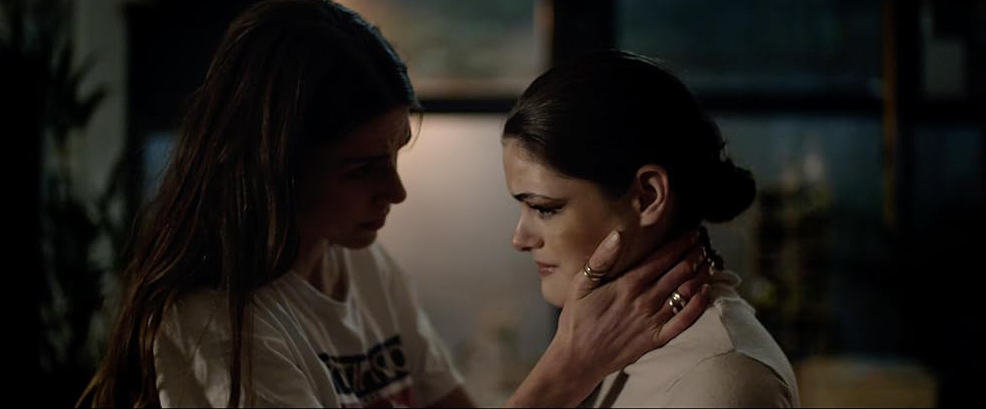
On when fame isn’t quite what you think
Billie Melissa Rogan: I think we all relate to that, and I think it doesn’t matter if you’ve been in music or film or any industry or any dream ever, you just are going to relate to that feeling of feeling so isolated despite everything that you want coming true. And the shame that comes with that of being like, “I feel like I can’t talk about it.”
Billie Melissa Rogan: Because there’s a scene between Sky and Ryan when Ryan’s like, “You’re living the dream here.” And she’s quite literally drunk and passed out on the floor and has had the worst night of her life. It’s like, “It’s his dream, but it’s not her dream and it’s not the dream that she expected it to be.” And I think that especially with social media and stuff, we make things look really shiny and clean and nice and it just is never, never that way.
Aayush Sharma: That’s why this short film felt really personal to me. Just like you, I was also a theater student. I have done acting for I think six to seven years and almost like hundred shows in India all around the country.
Billie Melissa Rogan: Oh my goodness. That’s so cool.
Aayush Sharma: But just like you said, not everything is meant to be yours. I think theater was not meant to be my life, and I had to switch my career to journalism. But I love journalism, I love watching movies. And I love writing about this. But if you take me back to six to seven years back, and if you wanted me to choose something journalism or acting, I would’ve chosen acting.
Aayush Sharma: I know how I felt at the time when I was feeling very vulnerable that either I need to achieve my dreams or I need to do something to help my family to get out of a dire situation. I think sometimes you are standing at a point where you want to get to your dreams, but you know that if you do achieve your dreams, something will be left behind that might be more important to you. I can feel that.
Billie Melissa Rogan: I really agree. And I think Cory really captured that on the page, and I think that that definitely came from a bunch of rewrites. It became more about that and less about commentary on social media. But it’s sad. I feel like everybody deals with it at some point in their life.
On casting the actors for I Love You, Guys
Aayush Sharma: Yes. But when we talk about I Love You, Guys, you guys are working with some of the best actors in town.
Billie Melissa Rogan: Yes, I agree.
Aayush Sharma: Becky Bush’s performance was so amazing. I wanted to actually message her on Twitter, “If you are up for an interview as well,” I think I might do it.
Billie Melissa Rogan: Do it.
On casting Becky Bush as Sky
Aayush Sharma: But she was so brilliant. She was so brilliant, I just wanted to know the casting process for this short film. What qualities were you looking for in your actors?
Billie Melissa Rogan: I love talking about them and I think they’re so talented. And I love talking about them. I love just being like, “They’re the best. They’re amazing. And a pleasure to work with them.” Becky was actually the first person to audition for the entire film. She was the first person through the door on our first day of casting, and the second she left, I was like, “Bring her back, bring her back, bring her back, bring her back. She’s perfect.”
Billie Melissa Rogan: I couldn’t get past her. And everybody who came in to audition was incredible, spectacular, amazing. We didn’t see one person who couldn’t have made the role work, but Becky just was Sky. She just understood the character. She just embodied it from the second she walked through the door to the second she left. And when she came back to do… What did we recall? I don’t remember now. It was so long ago.
Billie Melissa Rogan: I don’t think we did recalls for Sky. Maybe we did. Maybe we did. I don’t know. But anyway, the second she left, I was like, “She is everything. Bring her back, please.” And we basically cast the rest of the film around her, and we had the guys for Ryan come in and read with her, and we had the girls come in to read for Taylor opposite Becky because she was just so perfect for it.
Billie Melissa Rogan: She just really understood everything. And what I’m looking for, having grown up being an actor, it’s so much easier for you when you’re playing someone who just is you or just represents your experience. And I felt that Becky just understood it on a new level and also surprised me. She takes directions so well, so do all three of them, but I was always like, “It’s your character, you know Sky better than I do. You are the one with the answers.”
Billie Melissa Rogan: She always had something new to bring to it. She worked so hard. She’s amazing. She’s at RADA now and I think when you’re at RADA or just when you’re at drama school in general, you’re not supposed to do projects outside of school. Left in the dark without her, I’m like, “Becky, graduate, please, so we can work together again.” I’m waiting for her to be done, I’m like, “Right, let’s collaborate again.” But all three of them are the best of the best and just also the nicest people. All three of them are just so amazing. I don’t think that there could have been better people to work with.
On whether I Love You, Guys could become a feature
Aayush Sharma: Now as we talk about the stories, given the depth and potential of the story, have there been any discussion about expanding I Love You, Guys into feature length film, perhaps even as a musical?
Billie Melissa Rogan: Yeah. It was something me and Cory always joked about, because Cory had so many ideas. I was like, “Just save it and write a feature.” He just kept giving new ideas. I was like, “Cory, we can’t keep changing the script. It needs to stay at some point.” And we were like, “When we do the feature or when we do the series, whatever.” And then when it first released and people were watching it, the first thing most people said to us after was, “I wanted more, I want to know what happens next, or is there a feature?”
Billie Melissa Rogan: And I’m like, “It was a joke. It was supposed to be a joke. It seems like something serious now that we should probably do.” Me and Cory have spoken about it, but again, Becky’s not allowed to do anything. We have to wait for her first. But we definitely would. We have many ideas. I think we’ve spoken about the avenues that could go down. I think Cory and I might write it together and we’ll see what happens. No active development, but there is conversation.
Aayush Sharma: We would love to see a feature length film because the story was so beautiful and the direction everything is so good that we would love to see more of it.
Billie Melissa Rogan: I’ll tell everybody.
Billie Melissa Rogan’s Top Three Movies of All Time
Aayush Sharma: Now next set of questions are a bit tricky and rapid fire questions. Every time I ask these questions, people do tell me that, “Don’t ask them,” but I still do. But top three movies of all time?
Billie Melissa Rogan: Oh my goodness. Of all time, 20th Century Women, Mistress America. I don’t know. Lots of books is so easy because it’s four, Joy or Lady Bird probably.
Aayush Sharma: You can name four.
Billie Melissa Rogan: Actually, I’ll go different. I’m going to go 20th Century Women, Mistress America and American Hustle.
Actors she’d most like to work with
Aayush Sharma: Top three actors that you want to work with?
Billie Melissa Rogan: I have a massive list. Annette Bening, that’s one and Elle Fanning. I think she’s really interesting.
On top three most inspirational books
Aayush Sharma: And top three books that motivated you?
Billie Melissa Rogan: Books, I do read, I promise. I would say not just motivated me in film, but in life is The Sun Does Shine by Anthony Ray Hinton, Just Mercy by Bryan Stevenson and probably The Great Gatsby.
On top three musicians of all time
Aayush Sharma: Now I Love You, Guys, it’s all about music. Top three musicians of all time?
Billie Melissa Rogan: Oh my goodness. Alabama Shakes, I love them and I want nothing more than to have their music in my film one day, Dan + Shay, the country singers and Ariana Grande. No, sorry, Dan + Shay, sorry, I’m going to cut you off. Let me start again. Alabama Shakes, Jason Robert Brown. I love him. Everything he does I love and Ariana Grande.
On what Billie Melissa Rogan would be if not a filmmaker
Aayush Sharma: If you weren’t a filmmaker, what would you have been? You are a journalist, you are a film critic, but still, what would you have been?
Billie Melissa Rogan: What would I have been if I’m not a filmmaker? Defense lawyer.
On her new film, The Intimacy of Privacy
Aayush Sharma: I think this is the first time someone has said anything apart from the entertainment field. Everyone wants to be an entertainment lawyer or everything, but you chose something different. That’s good. My last question to you, Billie, I wanted to know about your upcoming film, The Intimacy of Privacy. I have seen it on social media. What themes does it explore and what can audience expect from this project?
Billie Melissa Rogan: The Intimacy of Privacy is the first time we get to direct my own writing, which is really exciting. And it is about two lifelong best friends who are caught in the what could have been. What people can expect is it’s the film that I have been searching for years. And if it existed, I wouldn’t make it because it would be a lot less painful, to not have to make it and just have someone else’s version of it.
Billie Melissa Rogan: But I feel like it seems on the surface, like a story that’s very tale as old as time type thing. It’s been done a million times before, but it really feels very personal to me. And the cast are great. They’re so great, and I can’t wait for people to see them. They made me cry in their audition. And equally, I hope people feel represented by it because it’ll make me feel less alone, but equally, it’d be very sad if other people can relate to it. But it means a lot. It’s like a very personal project to me, and it’s something that I can’t make another film until I make this one. It has to get made, and then until it’s made, I can’t make another film.
On the recent Academy Awards
Aayush Sharma: My last question, what did you think of the Academy Award winners that was just announced? Were you happy with those choices?
Billie Melissa Rogan: I didn’t watch it. And I won’t lie. I didn’t watch it; I chose to go to sleep, and I chose peace over violence.
Billie Melissa Rogan: I don’t need that. I find it very difficult because people trivialize it in a way that makes me very frustrated as a filmmaker, because it actually is so important as a filmmaker that what wins and what gets nominated really matters to me because I’m like, “That’s representative of what the industry wants and wants more of.” And I don’t know. I find it difficult every year when I see things get nominated or see things not get nominated, and I’m like, “It just feels like a stab in the heart sometimes.” That was not the straightforward answer that you wanted, but that’s what I feel.
Aayush Sharma: I just wanted to know that, are you a filmmaker for who winning an Oscar or winning an award means everything or not?
Billie Melissa Rogan: I think everybody, any filmmaker who tells you that they don’t want a shiny trophy to validate their stories is lying to you, because who doesn’t want the recognition of their industry to be like, “We really liked what you made and we really resonated with it?” Who doesn’t want to win an Oscar? Who doesn’t want the name engraved in gold forever? I certainly do.
Aayush Sharma: Thank you so much, Billie, for giving me your time. And I am so thankful that I watched the movie and I got to know you better as a person through this interview. And I just want the best for you, and I hope I could see your next film in a very big theater. Thank you so much.
Billie Melissa Rogan: Thank you. And thank you for taking the time to watch it and taking the time to speak with me. I really appreciate it.
I Love You, Guys is available to watch on YouTube.
You can watch the full film at the Static Flow Productions YouTube Channel.
You might also like…
‘The Greatest Hits’ Movie Review: Emotional, Charming & Predictable Time-Travel Adventure

